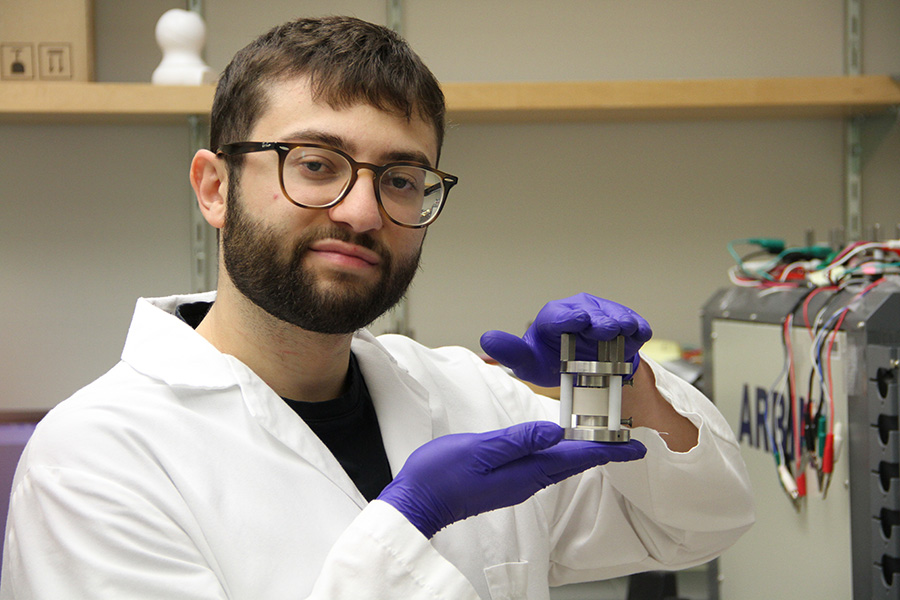FSU chemistry doctoral student receives Department of Energy research award to build safer, better batteries

People use lithium-ion batteries every day to power devices from toys to smartphones to electric vehicles and more, but organic liquid materials used to design these batteries are extremely flammable under certain conditions.
A Florida State University doctoral student working to replace these materials with safer alternatives will get the chance to further this work with the support of an Office of Science Graduate Student Research (SCGSR) Award from the Department of Energy.
Michael Deck has worked since 2018 to develop highly conductive, solid-state materials for lithium-ion batteries that demonstrate potential in electric vehicles, global satellites and reliable energy storage. With the SCGSR Award, he will head to Richland, Washington, next spring to spend five months working at the DOE’s Pacific Northwest National Laboratory (PNNL).
“I anticipate for the future of electric technology that my work will allow consumers to drive longer distances and with better acceleration in electric vehicles,” Deck said. “I also think there will be a new wave of applications for lithium-ion batteries, such as flexible batteries and even biologically compatible batteries to power implanted medical devices.”
At PNNL, Deck will try to craft a new kind of battery using solid inorganic materials instead of the flammable liquid materials that compose the current industry standard for lithium-ion batteries.
He then will use a technique known as dynamic nuclear polarization-nuclear magnetic resonance (DNP-NMR) spectroscopy to boost the signal intensity of his battery and to study the interface between the inorganic battery materials as well as assess battery reliability. This will help him facilitate the viability and commercialization of all-solid-state batteries.
“The basis of my research is that I work on creating new materials with enhanced lithium-ion transport within them for all-solid-state-batteries,” Deck said. “I do this to improve the materials we put into these batteries to make them last longer and operate more safely.”
Yan-Yan Hu, an FSU professor of chemistry and an expert on solid-state NMR, has served as Deck’s research adviser for four years and has worked with him in the FSU-headquartered National High Magnetic Field Laboratory. The Hu research group focuses on the design, synthesis and characterization of functional materials for energy storage and conversion.
“Michael Deck is a bright young scholar who has acquired an in-depth understanding of the importance of energy storage technologies and their associated challenges,” Hu said. “He is also an expert in solid-state nuclear magnetic resonance (NMR), a unique and powerful tool to address critical questions in lithium-ion batteries. Michael’s knowledge and expertise make him stand out.”
Deck built on his childhood interest in science by engaging with talented chemistry and physics teachers in high school. During his undergraduate studies at Binghamton University in New York, he worked with Stanley Whittingham, who won the Nobel Prize in Chemistry in 2019 for his development of lithium-ion batteries.
Deck plans a career working on energy storage applications for aerospace use, such as in satellites, planetary rovers and electric airplanes. The DOE award will give him the opportunity to network and collaborate with scientists and students conducting similar work.
“This will be a great experience to expand my knowledge of what’s out there in this field of chemistry research and meet incredible researchers,” he said.
Upon his return to FSU, Deck plans to finish his remaining experiments with the Hu research group and write his dissertation.
“I firmly believe that Michael will become a bright star and leader in the field of energy research,” Hu said. “He cares deeply about developing critical technologies that deliver high societal impact. Michael’s leadership qualities have been evident in his strong commitment to scientific research and science communication, keen sense of social responsibility and initiatives to engage the government’s interest in important scientific issues for society.”
